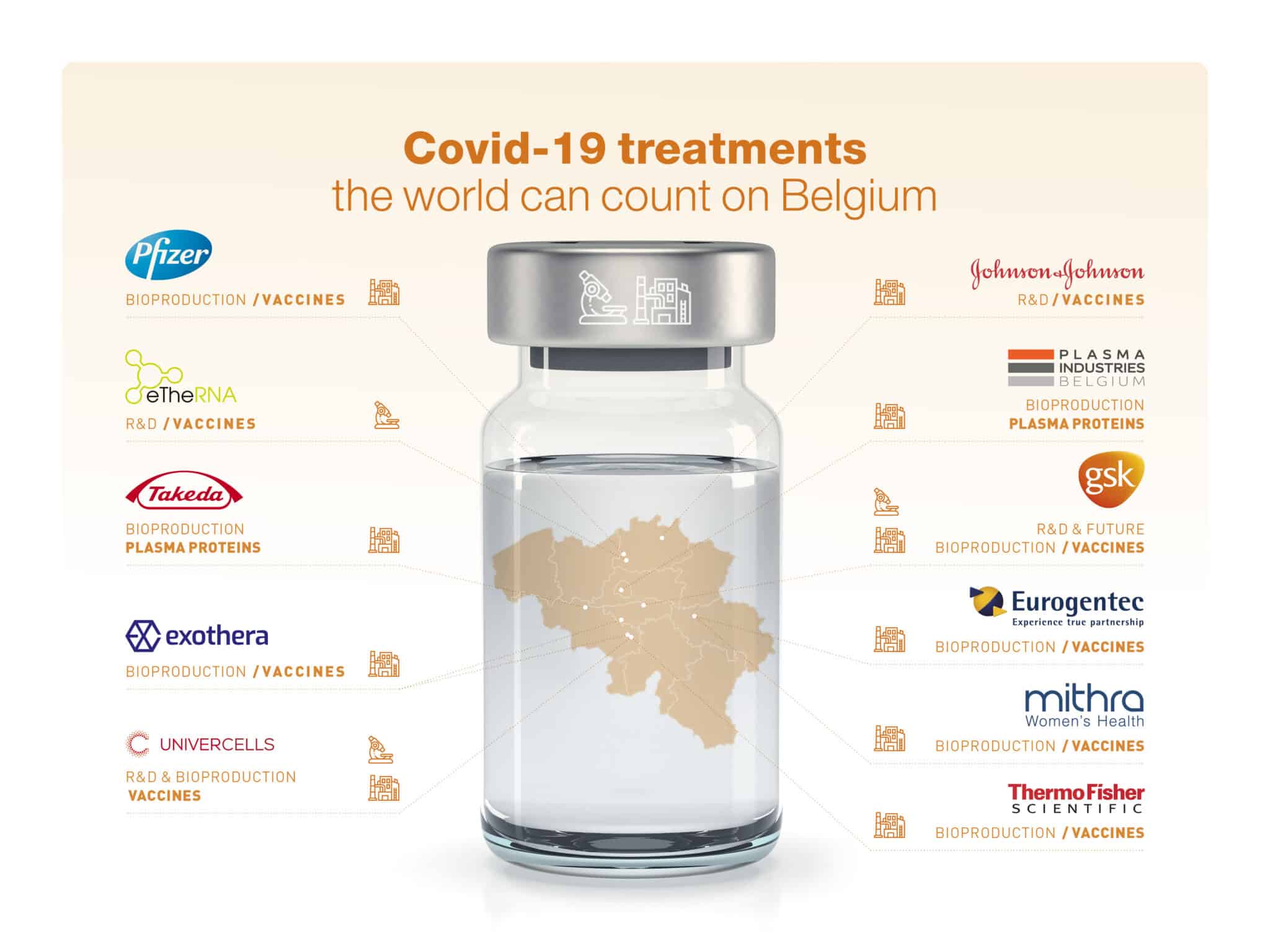bio.be/essenscia promotes Belgian biotech at the BIO International Convention
The whole world is taking an interest in Belgium, recently established as an important hub for coronavirus treatments and vaccine development, production, and distribution. The economic recovery provides an opportunity to turn Belgium into a leading ‘health and biotech valley’. How? By strengthening industrial production capacity, to be able to produce the many promising innovations in biopharmacy and biotechnology in our country. This strengthening of local capabilities goes hand in hand with the creation of many additional jobs. To attract investment, we need to work on strategic international positioning, have a targeted innovation policy and train more STEM talent with digital skills. These are the messages from bio.be/essenscia, the Belgian federation of life sciences and biotechnology, at the launch of the BIO International Convention, the world’s largest biotechnology forum, which this year takes place online from June 10 to 18, 2021.
Why do we excel in biotechnology? Belgium has a unique ecosystem that covers the entire value chain: from preclinical research for cutting-edge biotech production to the logistics platform for global distribution.
10,000 more jobs in 10 years
In the last ten years, the number of workers in the biotech and biopharma sector has increased by 41%, from about 25,000 to more than 35,000, including more than 3,000 R&D experts in biotechnology research. In the same period, sectoral exports have almost doubled to more than 53 billion euros in 2020. Research and development spending has increased by 166%, from 1.9 billion in 2010 to more than 5 billion euros last year.
Unique expertise in biotech
Over the years, strong biotech clusters have emerged, including those in Ghent, Charleroi, Leuven and Liège, where universities, research centres, hospitals, spin-offs and start-ups, SMEs and large international companies collaborate.
This unique cooperation and concentration, combined with Belgian agility, have led to exceptional expertise, especially in technologies such as messenger RNA, plasmid DNA, cell and gene therapy and monoclonal and polyclonal antibodies.
At the forefront of the fight against coronavirus
Belgian expertise is now recognized worldwide in the fight against Covid-19. The town of Puurs is famous not only for its Duvel beer, but now for its production of Pfizer-BioNTech mRNA vaccines too. As well as Pfizer, Belgian companies, and Belgian branches of international companies – like eTheRNA, GSK, Janssen Pharmaceutica, Kaneka Eurogentec, Mithra, Plasma Industries, Takeda, Thermo Fischer, Univercells and its subsidiary Exothera – contribute their know-how to the development and production of vaccines and treatments against the global pandemic.

The key role played by Belgium in the global fight against the coronavirus illustrates how biotech companies are increasingly moving from ‘invented in Belgium’ to ‘made in Belgium’. The development of several CDMOs (Contract Development and Manufacturing Organizations) and the list of recently announced investments by international companies in extra production capacity in Belgium, are proof of this.
Innovating and producing more
Many Belgian biotech players have plenty of innovation projects in the pipeline: breakthrough drugs and treatments that are about to be commercialized and produced on an industrial scale. To structurally support this evolution, there needs to be easier access to venture capital, sufficient STEM talent with digital skills and an innovation policy that supports every opportunity to develop breakthrough therapies.
“To stimulate local establishment of the biotech sector, we need to focus on financing and talent development”
Frédéric Druck, Secretary General of bio.be/essenscia
Frédéric Druck, Secretary General of bio.be/essenscia: “Many Belgian biotechs at the end of their development cycle are on their way to becoming success stories with the launch of their products on the market. To stimulate local establishment of the biotech sector, we need to focus on financing and talent development. If we want to compete internationally, we must think about setting up a European investor platform to attract more venture capital. With Euronext Brussels, we are well-placed to achieve this ambition. To enable the transition to highly digitalized ‘factories of the future’, we need to accelerate education and training in digital skills. Our country can be a leader in this area.”
“Let us use the agility of our Belgian biotech sector to keep our country in pole position on the international stage”
Tineke Van hooland, Deputy Secretary General of bio.be/essenscia
Tineke Van hooland, Deputy Secretary General of bio.be/essenscia: “The wind is changing in the biotech sector. More and more countries recognize the added value of biotech in economic and societal terms. If we want to maintain our place as Belgian champion in innovation and biomanufacturing, we must secure strong international positioning combined with a differentiating fiscal approach. Centres of excellence for innovative treatments, such as ATMPs (Advanced Therapy Medicinal Products) for cell and gene therapy or mRNA/pDNA technologies, health hubs for data analytics and a strategy to address shortages of certain critical materials for production are other avenues to explore. Let us use the agility of our Belgian biotech sector to keep our country in pole position on the international stage.”

